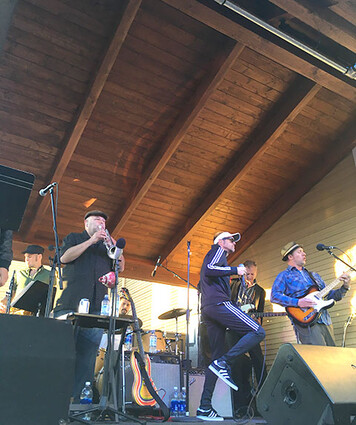in The Pines: Art Wins Big
Last updated 6/25/2019 at Noon

TL Brown
Sisters Saloon played host to a perfect outdoor concert evening featuring The Daddies from Eugene.
It was the 1980s. I was too young to drive, too restless to bear the confines of country life. On the cusp of my 13th birthday I was in a serious car accident, and afterwards found myself subject to wild swings of mood.
My horse Robbie had an accident, too, one that tore open his leg. Instead of trail riding through the woods and jumping at our 4H club, I rode my bicycle miles to tend his wound—every day for months.
During those months, I discovered boys. I discovered punk, new wave, David Bowie, and the Beats. Poor Robbie didn’t stand a chance.
My new, teenaged self had a fierce appetite for culture. Lazy days at the pond, watching my brother and his friends throw firecrackers at each other were no longer enough. Playing piano for services at the little white church every Sunday was not enough (though I enjoyed sneaking New Order and Cure songs into my offertory improvs).
My restlessness grew to a profound state of dissatisfaction, then depression. Startling suicidal ideations popped up. I hungered for something bigger, weirder, and headier.
Thanks to books and zines, poems and alternative radio, I knew I was not alone. Lots of people felt this way. They traveled, moved to big cities, hitchhiked across America. They wrote songs, stories, poems about it all. Maybe someday I would, too.
Robbie mostly recovered. I still rode him sometimes and helped round up cattle, but I abandoned 4H. I felt guilty. For his part, Robbie seemed to like lazing about the pasture, munching grass. As for me, I needed something more.
It happened that I lived near a university town: Eugene, Oregon. My friends and I discovered that if we could get a ride to campus, a new world of possibilities opened up.
One day we came across a group of young men shouting surreal slogans atop a grassy hill. They commenced, with great flourish, picking up trash. Then they stopped and declaimed poetry to bemused passersby.
They called themselves the Joy Scouts. They handed out flyers collaged up with chainsaws and manifesto slogans. One poet wore a Lone Ranger mask and a long cape embroidered with the words “ART WINS BIG.” Well, not so much embroidered as outlined in masking tape.
We were enchanted. Soon we joined the periphery of their adamantly creative world, rich with DIY art, performance, and music. We watched the Big Time Poetry Theatre (with Really Famous Guys). We listened to the band Saint Huck play shows in everyday houses with quasi-official names like The Be.
The bass player, Dan, fed us leftover spanakopita after his shifts at Poppi’s Greek restaurant. The singer, Steve, spun records at house parties, dipping us into swing and jazz along with punk and ska.
When our favorite hangouts — Lenny’s Nosh Bar and Poppi’s — were threatened by development, we all took to the streets in a Dada-Beatnik protest parade. We didn’t save that block of East 13th Street, but in all the hubbub, I think we might’ve saved me.
I was tangential to their scene, a hanger-on high school girl in a thrift-store beret and her dad’s plaid flannel, leaving parties early to make curfew. But those ferociously creative 20-somethings were important to me.
They showed me a path. Through them I saw that bursts of wild expression and inventiveness were not reserved for famous dead guys, for the denizens of fancy cities like Paris and New York. Creativity was for whoever dared to express it.
If they could do it, I figured, so could I.
As for those young men? Some went on to be poets, graphic designers, and journalists. Some went on to form a band called the Cherry Poppin’ Daddies. The name caused a minor ruckus, one that revealed the divide between older feminists and my generation; regardless, the Daddies got popular in Eugene.
When I came home from college, instead of shyly watching them play in living rooms, I got a concussion in the pit when they opened for Fishbone. Eventually they made it big, touring nationally and playing with famous ska, punk, and swing bands.
I saw the Daddies play at Sisters Saloon on June 22. It was a perfect summer evening, dappled by cool wind. The show was sold out, but there was plenty of room to dance and move through the crowd.
Some nostalgia was inevitable. I was there with old friends, seeing oddly familiar-looking faces around us — middle aged faces we couldn’t quite place.
Mainly, though, I absorbed the fantastic creative energy that flowed from the stage in 2019. The band’s talent, humor, and intensity had not abated with time. Rocking the three stripes and apologizing for having a cold, Steve seemed unchanged from that Fishbone show some 28 years ago.
Horns hollering, bass grooving, guitars snarling, the band tore into songs new and old. They seemed surprised by how many audience members in little ol’ Sisters could sing along — not just with their big hit, “Zoot Suit Riot,” but with lyrics like, “Flovilla! Oooh-ooh-ooh! I’m your virile garbage man!”
We had a heck of a good time. My friends brought their son, a teenager, wearing black just like we used to. Steve and Dan recognized us grownups from back in the day.
Dancing and grooving along, I felt released from the constraints of my everyday life as a working parent, freelance writer, and overzealous community cheerleader. I laughed and clapped and sang. I felt free again.
The show was a potent reminder: creativity matters, wherever you find it. It’s not reserved for big cities, and it’s not reserved for the young.
Creativity is for everyone.















Reader Comments(0)